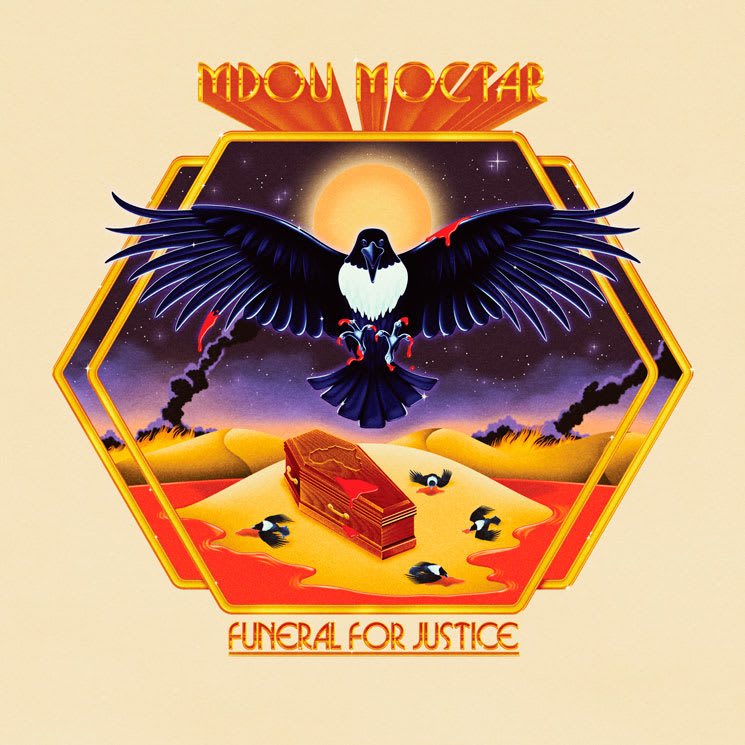Admittedly, Mdou Moctar and I got off on the wrong foot. Having grown up with East African parents with no affinity for FM radio, many a Saturday morning was spent in a hypnagogic, nauseated haze as a hapless passenger, running errands and listening to the same four Ethiopian CDs that seemed to host a dozen of the same ol' song. The incessant stomp-clap-shuffle beat and aversion to Western rhythms and melody had me swear off the tedium that was my ancestors' groove and drove me to the sort of pop eclecticism that shapes a young pundit. Mdou Moctar, the name of both the Nigerien guitarist and his desert blues quartet, has evoked those memories in spades.
Whatever modal realm unites these disparate African stylings is beyond me, but even I can recognize that bias stemming from champagne trauma is a tad unfair — not that Moctar and his troubadours need the help given their fresh approach. The band's recent presence at Coachella was the result of organic growth and plenty of good will, no calculated Shankar-at-Woodstock ethnic spice for the ostensibly hip congregation. The band's unique fusion of traditional Tuareg music with Western guitar virtuosity — and their rags-to-riches tales of bicycle-string guitars and MP3 file sharing — has made them rising stars and festival favourites.
The unique appeal of Mdou Moctar, beyond first-encounter novelty for Westerners, is the way they invert the once-maddening recursive rhythms of their traditions into quick bouts of one-chord riffing, winding solos and AOR ambition. On their first record for Matador Records, where indie rock goes to be canonized, the daring synthesis of blooze and foreign modal scales was a great success, combining native song with psychedelic streaks and lush production.
On new album Funeral for Justice, they pick up right where they left off. The music here is so energetic that it's invigorating thanks to Mdou Moctar's incandescent fury, conviction and undeniable gifts with the axe. The title track wastes no time introducing their otherworldly throb, the traditional beat punctuated with bursts of heavy downstrokes for an explosive opening salvo.
"Imouhar" distinguishes itself as perhaps the most dynamic rock song of the year so far, with Moctar and co. wholeheartedly embracing lo-fi scuzz before breaking out into a stadium-sized roll. It's distinctive even among an album chock-full of iconoclastic cries for revolution soaked in reverb. Drummer Souleymane Ibrahim holds his own against Moctar's six-string onslaught, with sly percussion flourishes and every pummel of the kit an attack on idle feet. On that track's flipside, "Takoba" skews closer to home, a languid, ornate desert march that's perhaps the most sterling example of the assouf style, all camel strut and fretboard musing.
"Sousoume Tamacheq" maintains the verve with soaring choir and a frenetic finish, while "Imajighen" and "Tchinta" hold their own despite disinterest in distinguishing themselves. The astutely placed interlude "Djallo #1" segues into the last two tracks, overt political pleas decrying colonialism in Niger and the subjugation of its people. Tumult in the Northern African nation means the entire project, as implied by its title, is politically charged. Staidly translated lyrics aren't of much interest, even if they were provided prior to review; sentiment can be gleaned from Moctar's vocal stance on the subjects in interviews.
"Oh France" goes all do-re-Malmsteen with some fleet-fingered arpeggios, before switching to a more traditional but no less kinetic riff scheme for some decidedly involved activism. "Modern Slaves," the demure closer, is communal; you don't need a lyric sheet to feel this call for liberation. It's a perfect coda for an electric set, an endorphin rush after great exertion.
The production is a tight fit, courtesy of bassist and producer Michael Coltun. Coltun is respectful enough to maintain and amplify Mdou Moctar's musical leanings while consciously tapping into their desert myth — the expanse is palpable, vocals distorted like hot Saharan air, and the howl of wind over sand dunes in the infrequent instrumental breaks are transportive.
Moctar has refashioned a piece of my own musical history, now shiny and chrome. The grandeur is all-enveloping here; a minor epic built from a surfeit of dissident spirit and Van Halen fanaticism. Don't let Mdou Moctar be the close-kept secret of suburban shamans the world over — this is pure Tuareg delight, palatable for all.
